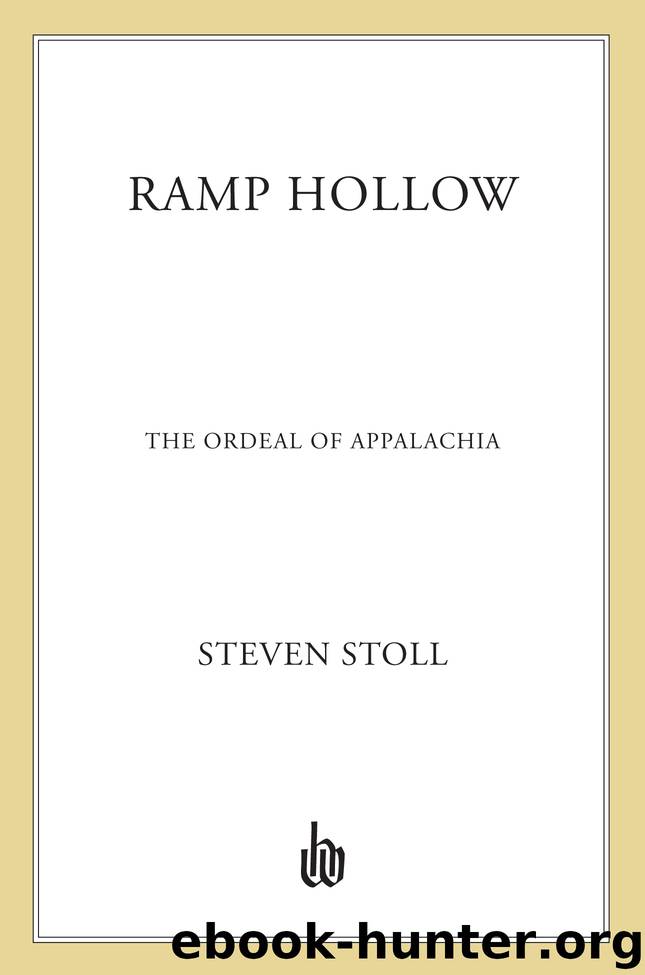Ramp Hollow by Steven Stoll

Author:Steven Stoll
Language: eng
Format: epub
Publisher: Farrar, Straus and Giroux
6. The Captured Garden
SUBSISTENCE UNDER INDUSTRIAL CAPITALISM
I want to propose a more radical notion of displacement, one that, instead of referring solely to the movement of people from their places of belonging, refers to the loss of the land and resources beneath them, a loss that leaves communities stranded in a place stripped of the very characteristics that made it habitable.
—Rob Nixon, Slow Violence and the Environmentalism of the Poor (2011)
IN MARCH 1907, AN ITINERANT MINISTER arrived among the shanties owned by the Pocahontas Coal Company. In a sermon given where he stood, the preacher declared that the miners deserved more than the company paid them. A manager approached the visitor and invited him to dinner at his home that evening. As soon as the door closed, a squad of armed bookkeepers and clerks surrounded the preacher, clubbed his head and face, broke his ribs, and dragged him to the church, leaving him to bleed through the night on the floor. The miners threatened war when they learned about the attack. One vowed in a letter to the company president that if any of his thugs walked the streets of Davy, West Virginia, they would be “wiped off the face of the earth.”
Everything about coal mining instigated class warfare. Whenever miners attempted to improve their lives within their constitutional rights to assemble and organize themselves, coal operators responded with violence. The camps operated like small police states, unincorporated private municipalities where company rules functioned as martial law. But while militant strikes, fought with bats, bullets, and poisonous gas dropped from military airplanes, made newspaper headlines across the country, slow violence cut across the underbelly of mining families. Their dependency on company housing and company money spent for food in company-owned stores amounted to a constant threat of eviction and starvation. Coal operators wielded subsistence as a weapon. Miners tried to take it away from them.1
When mountain households entered the coal camps, the trapdoor of dependency slammed behind them. James Watt Raine, a professor of English at Berea College in Kentucky, had seen them seeping out of the hollows for twenty years. Raine traveled around talking to people and recording what he saw. In The Land of Saddle-Bags (1924), he wrote of their peril. The mountain man who became a miner “moves his family and a few household goods from the picturesque cabin in the cove or on the ridge to a desolate shack in the sordid village that has sprung up around the mine. He had not realized that he would have to buy all his food … He has to pay even for water to drink.” Rent on their uninsulated board-and-batten shanties ran against these families all the time, even when the mines were closed, a policy meant to “bind them as tenants by compulsion … under leases by which they can be turned out with their wives and children on the mountainside in midwinter if they strike.” Raine saw every autonomous path to money and exchange blocked, leaving
Download
This site does not store any files on its server. We only index and link to content provided by other sites. Please contact the content providers to delete copyright contents if any and email us, we'll remove relevant links or contents immediately.
International Integration of the Brazilian Economy by Elias C. Grivoyannis(107259)
The Radium Girls by Kate Moore(12009)
Turbulence by E. J. Noyes(8014)
Nudge - Improving Decisions about Health, Wealth, and Happiness by Thaler Sunstein(7685)
The Black Swan by Nassim Nicholas Taleb(7095)
Rich Dad Poor Dad by Robert T. Kiyosaki(6588)
Pioneering Portfolio Management by David F. Swensen(6278)
Man-made Catastrophes and Risk Information Concealment by Dmitry Chernov & Didier Sornette(5993)
Zero to One by Peter Thiel(5778)
Secrecy World by Jake Bernstein(4735)
Millionaire: The Philanderer, Gambler, and Duelist Who Invented Modern Finance by Janet Gleeson(4456)
The Age of Surveillance Capitalism by Shoshana Zuboff(4272)
Skin in the Game by Nassim Nicholas Taleb(4229)
The Money Culture by Michael Lewis(4182)
Bullshit Jobs by David Graeber(4170)
Skin in the Game: Hidden Asymmetries in Daily Life by Nassim Nicholas Taleb(3983)
The Dhandho Investor by Mohnish Pabrai(3747)
The Wisdom of Finance by Mihir Desai(3724)
Blockchain Basics by Daniel Drescher(3571)
